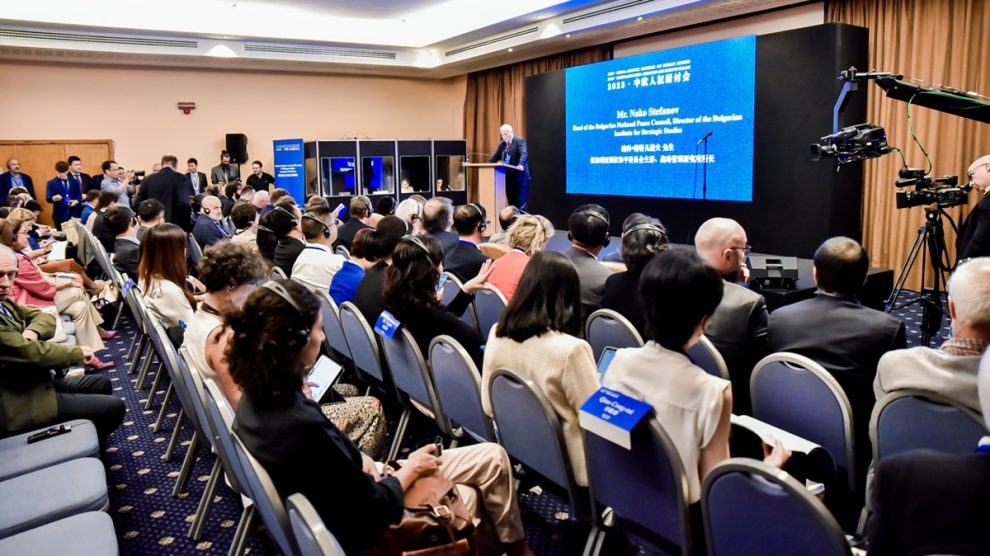Human rights with Chinese characteristics. Last week, the 2023 edition of the Sino-European Seminar on Human Rights took place at Rome’s La Sapienza University. As Decode39 anticipated, the event was co-organised by the China Society for Human Rights Studies, Beijing’s most important (and State-affiliated) human rights NGO. The seminar featured a delegation of over 50 Chinese scholars and other Italian and international academics, and China’s Ambassador to Italy, Jia Guide, was also in attendance.
- Organisers describe the seminar – now at its seventh edition – as a platform to discuss “modernisation” and “diversity” in human rights and bring forth China’s take on social issues – meaning it’s a way for Beijing to broadcast its narrative and defend its human rights track record on the international stage.
Hey readers – we’re on China’s Global Times! On Monday, the Chinese Communist Party’s State-controlled international propaganda outlet published an “in-depth” follow-up piece on the seminar, titled “Chinese, European scholars call for cooperation, dialogue amid alarming trend of politicisation, instrumentalisation of human rights.” The article quickly takes issue with the coverage of the event – including our own.
- According to the authors, the seminar attracted international attention “due to its theme on human rights and its timing.” They draw a line with a US-led “onslaught against China” (a recurring theme) and Italy’s moves to exit the Belt and Road Initiative.
- The Global Times then cites Decode39’s reporting and contextualises it as follows.
“The narrative that China is working to alter the definition of human rights to confront the US and the West has been routinely spread in recent years together with intensified scrutiny on seminars held by Chinese universities and think tanks. But such chatter has not stopped Chinese scholars’ enthusiasm in having exchanges with global experts as they believe that only communication can dispel the misunderstanding surrounding China’s human rights situation and promote global human rights governance.”
Don’t curb your enthusiasm. Describing the event as a joyous encounter and platform for fruitful exchanges between academics, conducted in the face of the supposedly oppressive Western narratives that prevent Chinese scholars from speaking of human rights on par with the rest of the international community, is the Global Times piece’s throughline. Its other major element is the celebration of China’s and the CCP’s dedication to “human progress and global harmony,” along with a dash of self-pitying and a healthy serving of West-bashing (more on that below).
- The article also describes an encounter between critical Italian journalists and Hu Lanbo, head of the China-friendly Roma 9 Association and unofficial point of contact between Beijing’s apparatus and Italian sympathisers. Unsurprisingly, that exchange reportedly ended with an agreement and a group photo.
-
- The Global Times notes that “such scenes were also common at the previous China-EU seminars.”
-
It’s not us, it’s you. At the seminar, Ambassador Jia “called for the promotion of the healthy development of the international human rights cause, which requires unity, not division, and cooperation, not confrontation.” According to the Global Times, he also said that China “is willing to work with the international community to abide by the purposes and principles of the United Nations Charter and conduct human rights exchanges and cooperation on the basis of equality and mutual respect.”
- Finally, Mr Jia called for the international community “to oppose the politicisation and instrumentalisation of human rights issues, and promote global human rights governance in a fairer, more just, reasonable, and inclusive direction moving forward, promote the construction of a global community of shared future, and jointly build a better world.”
- Citing “analysts,” the article claims that “the anti-China stance has become ‘politically current’ in the West, posing barriers in communication between China and Europe” because of “the influence of some anti-China politicians in the EU and the US.”
Beijing-speak on Xinjiang and sanctions. “Echoing Jia, many foreign scholars also expressed their worries over the alarming trend of weaponising human rights topics,” continued the Global Times piece. It then goes on to cite Fabio Marcelli, former director of the Institute for International Legal Studies at Italy’s National Research Council and longtime Beijing apologist, who “criticised some countries [for] using human rights causes as tools to contain other countries’ development, including imposing sanctions or employing stigmatisation.”
- Mr Marcelli also dispelled the extensively documented and UN-denounced human rights violations against the Uyghur minority in China’s Xinjiang region as “no more than propaganda,” stating that “related topics have been instrumentalised.”
- “[T]he outside world can see China’s measures in prioritising its underdeveloped regions. If people promote development in the same way it has been in the region, many underdeveloped places around the world will benefit greatly,” he claimed.
So much for “mutual respect.” For all the talk of harmony and open cooperation, speakers didn’t shy away from abrasive claims. “During the seminar, mutual understanding and respect were stressed despite different views,” reads the Global Times piece, right before reporting comments from Wang Wen (executive director of the Chongyang Institute for Financial Studies at the Renmin University of China) about the “[poor] sanitation conditions in some European cities, especially Paris, Madrid, and Milan” which “violate people’s right to live comfortable lives in cities.”
- Mr Wang also said that “high commodity prices and the crumbling infrastructure” make him question “whether Europe is indeed paying attention to human rights” and that European Commission President Ursula von der Leyen (who recently bolstered the EU’s attention on China’s unfair market practices) “is leading Europe into an infinite abyss.”
- That might be because “Europe may be suffering from the arrogance, ignorance, and laziness of some politicians and their lack of understanding of China’s human rights development,” he remarked – a phrase that reportedly “led to some laughter and applause.”
Image via China Human Rights




